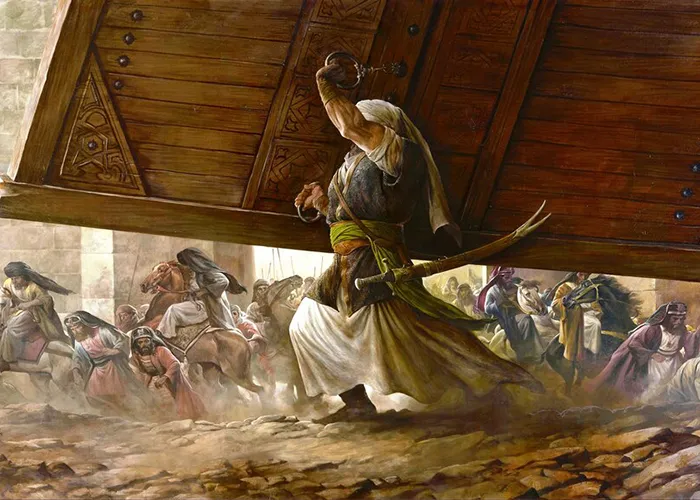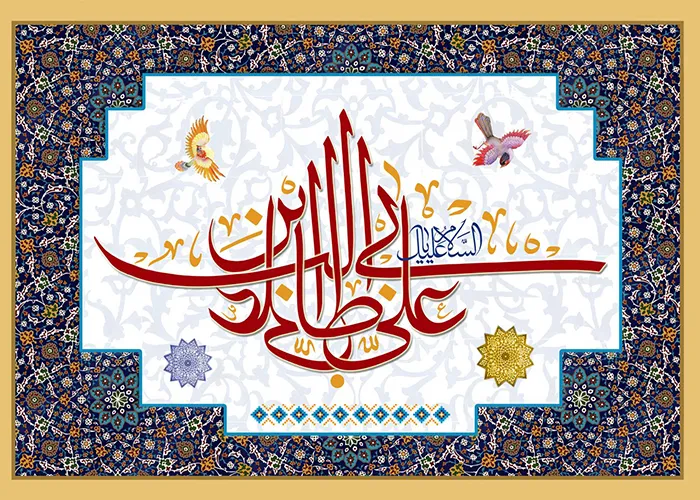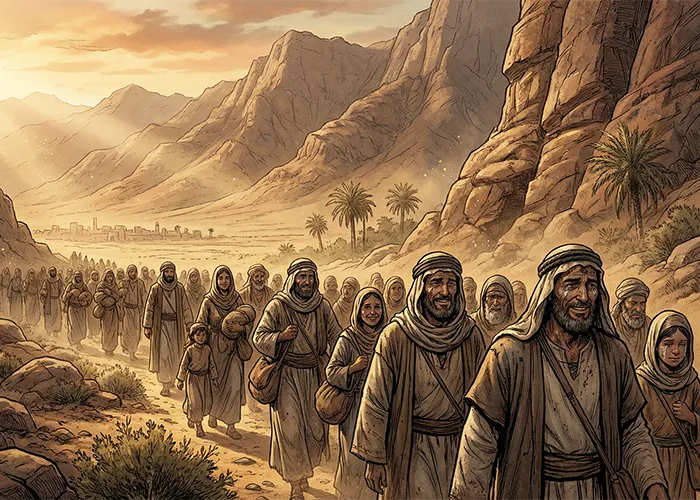Topic of the Week – Friday Bulletin Issue08
The Role of Imam Sajjad (AS) in Exposing Yazid’s Government
Seyed Hashem Moosavi
Several days have passed since the tragic event of Ashura, and the caravan of captives from the Ahl al-Bayt (AS) have reached the land of Sham. These days, in terms of hardship and sorrow, were no less severe than the Day of Ashura itself and, according to Imam Sajjad (AS), were the most difficult and painful days of his (pbuh) blessed life.
The movement of the captives, along with the heads of the martyrs, through the cities of Kufa and Sham, and the powerful and revealing speeches of Lady Zainab (SA) and Imam Sajjad (AS) led to a new chapter in the bloody and revolutionary movement of Imam Hussain (AS). This chapter transitioned to one of enlightenment and conveying the message of Ashura.
The captives of the Ahl al-Bayt (AS), including Imam Sajjad (AS), were taken to Sham by Yazid’s regime as part of a strategy to demoralize, defame, and show its power. The oppressive government aimed to humiliate and break the resistance of the Ahl al-Bayt (AS) and to showcase its authority to the people of Sham. However, Imam Sajjad (AS) and Lady Zainab (SA), through their strategic patience, wisdom, courage, and unique persuasive speech, turned this satanic plan into an exceptional opportunity to expose Yazid’s tyranny and play a crucial role in awakening and informing the public, who, under the influence of the Umayyad propaganda, knew no kinship to the Prophet (PBUH) other than the Bani Umayya.
The Umayyad propaganda had deeply infiltrated the lives of the Muslims in Sham, presenting a pure and innocent image of themselves. Many people of Sham never imagined that the ruling government would commit such a horrific act and massacre the Prophet’s family (pbut). They believed that the event of Karbala was a rebellion by outsiders against the Islamic government, which had to fight them to preserve Islam. Hence, they thought the men were killed, and the women were taken captive to be displayed in the cities.
This reality can be seen in historical accounts and statements, as well as in the conversations between some of the people of Sham and the captives of the Ahl al-Bayt (AS). In “Maqtal al-Hussain” by Abdul Razzaq al-Muqarram, it is mentioned that when the captives of the Ahl al-Bayt (AS) arrived in Damascus, Yazid issued special orders. One of these was that town criers announced that the severed heads and the women and children of those who were their enemies and intended to overthrow the government of Iraq were entering the city. Consequently, anyone who loved the caliph should celebrate today.
Following this command, the people of Sham wore colourful clothes, adorned themselves, raised coloured flags on their rooftops, set up drinking stalls in every alley, congratulated each other, sang, and rejoiced. They went to the city gate to see the captives, who were entering Damascus with spear-bearers carrying the heads of the martyrs. Upon seeing the family of the Prophet (pbuh), the people began to curse them, calling the captives who had been taken to save Islam as outsiders.
When the captives arrived in Damascus, an old man approached them and said, “Praise be to God who destroyed you, relieved the people from your tyranny, and granted victory to the Commander of the Faithful over you.” Imam Sajjad (AS) responded to the man by reciting verses from the Quran about respecting and showing special attention to the Prophet’s relatives (pbut). He asked the old man if he had read these verses. The man replied that he had but did not see their relevance. Imam Sajjad (AS) explained that these verses were revealed about them, the family whom God had purified from all impurities and whose love was a reward for the Prophet’s (pbuh) mission.
Furthermore, Imam Sajjad’s (AS) sermon in the Umayyad Mosque in Sham, where he introduced himself (pbuh) and his family (pbut) as the closest relatives of the Prophet (PBUH), is one of the best proofs of the depth of the Umayyad propaganda against the Prophet’s family (pbut) and the pivotal role of Imam Sajjad (AS) in clarifying Imam Hussain’s (AS) movement.
In this sermon, delivered in the presence of Yazid, many city leaders, and a large group of ordinary people from Sham, Imam (pbuh) initially introduced himself (pbuh) briefly, saying, “We possess knowledge, patience, generosity, eloquence, courage, and love in the hearts of the believers. Our virtue is that the chosen Prophet is from us, the greatest friend is from us, the Lion of God and the Lion of His Messenger are from us, and the two blossoms of this Ummah are from us.” Then he cried out, “O people, whoever knows me knows me, and whoever does not, I will introduce myself. I am the son of Mecca and Mina, I am the son of Zamzam and Safa…”
He continued, “I am the son of the one who carried the Black Stone in his cloak and placed it in its position. I am the son of the best pilgrim who performed the rituals. I am the son of the one who was taken up in the air on the Buraq. I am the son of the one who was taken by night from the Sacred Mosque to the farthest mosque, so glorified be He who took him. I am the son of the one whom Gabriel led to the Sidra al-Muntaha.”
People were amazed at these virtues and perfections that Imam Sajjad (AS) attributed to himself (pbuh) and wondered who this captive was, claiming such high status. The Imam (pbuh) continued to introduce himself (pbuh), saying, “Do you know whose son I am? I am the son of Muhammad al-Mustafa, I am the son of Ali al-Murtadha, I am the son of Fatimah al-Zahra, I am the son of the best of women in the world.”
These heroic and passionate words of Imam Sajjad (AS), delivered with unique determination and courage, targeted the very fabric of the Umayyad government and awakened the people of Sham, who had celebrated Yazid’s victory over Imam Hussain (AS), from their ignorance. Their celebrations turned into mourning. Yazid, fearing rebellion and unrest and avoiding accountability, ordered the muazzin to call the Adhan to interrupt the Imam’s (pbuh) speech. However, the Imam (pbuh) wisely used even the Adhan to his (pbuh) and the Ahl al-Bayt’s (AS) advantage against Yazid and the vile Umayyad lineage.
Following this speech and Imam Sajjad’s (AS) revelations, the people of Sham condemned the tragedy of Karbala and increased their support for the Ahl al-Bayt (AS). This forced Yazid to blame the governor of Iraq, Ubayd Allah ibn Ziyad, for the murder of Imam Hussain (AS) and the captivity of his family (pbuh), outwardly criticizing him to deflect blame.
In conclusion, to better understand the impact of the Karbala uprising and Imam Sajjad’s (AS) revelations, we refer to a saying of Imam Sadiq (AS): “When the captives of the Ahl al-Bayt (AS) returned to Medina from the sorrowful journey of Karbala, Ibrahim ibn Talha ibn Ubayd Allah, who was among those welcoming them, asked Imam Sajjad (AS): “Who won this battle?” The Imam replied: “If you want to know the real victor, call the Adhan and Iqamah at the time of prayer and see whose name is mentioned.”
news via inbox
Subscribe to the newsletter.




